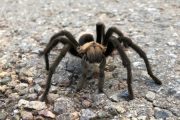THE CROW
By Dianne J Ferris
The crow is not only one of the most intelligent birds alive, he is also the loudest. From very soon after his egg opens, to long after his solo flight, his demanding call can be heard reverberating throughout the forest. His bad reputation of thievery and mimicry precedes him, causing many people to dislike him. However, he is actually an important forester and our ecology is dependent on his nature. Crows plant many trees in forests, hiding their chestnuts or pinecones which they dig into the soil to save for another day.
In a crow’s early life sometimes, if there are 3 or 4 young crows in the nest and according to his size and rate of growth, one young chick may fall from the nest to the forest floor. Many times the mother crow will continue to feed this unfortunate chick, but some scenarios will change, if the young one strays away from the nesting tree. A crow’s curiousity could lead him away from family support and he may become a victim to a predator. Fortunately, this did not happen to the crow that became part of our family.
My children’s grandfather, who loved to walk daily through his forest-surrounded home, one day found a crow chick calling loudly for food. Being a person who loved birds, he could not just leave this crow to a chancy destiny. He swooped him up in his jacket and took him home and to raise him. He bought a friend’s large bird cage he knew of and it wasn’t long after that, Grandfather arrived at our home in the country, anxious to find someone else to feed a ravenous crow. I had always marvelled at watching crows in flight, and looked forward to sharing our home with this quite large, pure black, almost bald-headed crow. The feathers on the tops of a crow’s head are the last feathers to replace their baby fuzz.
Life certainly became more exciting after Blacky joined our family. He truly believed he was one of us. He would eat just about anything given him and he grew fast. The kids loved him and never tired of feeding him, laughing always at his turkey-gobbling sound crows make when being fed and what they referred to as his ‘thank you’.
I believe he bonded with me early, when I turned over a log and found him his first tasty morsel of dew worm. But perhaps it was before that, when he and I spent our first day together trying to communicate. He always answered me, with a low Caw, as if he understood.
Fed well, Blacky grew fast and his wing span was enormous. He could fly well and amazed us all with his precise landings. We kept him in his cage in the basement at night, but let him out to fly in the mornings early. His favourite perch was high on the branches of the elm tree, at the corner of our property.
One warm afternoon, when I returned back outside from the house, Blacky and I stopped traffic. A person in a car driving by our house, stopped to watch us when Blacky hopped off the high tree branch and soared down to land on my outstretched arm. From my arm, Blacky would skip-hop up to my shoulder; another favourite perch of his. I walked with him toward our garden, to do my weeding and the driver in the car finally travelled on his way. Obviously he’d never seen a black crow riding on a woman’s shoulder before.
On hot days in the garden, Blacky would hop under me and into my shadow, when I squatted in the garden, weeding. I would feed him peas from the pea patch, which he loved, reminding me so, with his loud gobble as he swallowed. He was quick to rid the garden of bugs for me, as well.
One day, I found a large hornworm on my tomato plants. I have never liked handling these fat, ugly worms and I pointed at this destroyer of tomato plants. “Get him, Blacky.” I urged him. Blacky hopped toward the worm, which sat high on the leaf of a plant, even with Blacky’s chest. The worm obviously recognized a predator and lifted its horn on its back end up and made a clicking noise, I had never heard before. Blacky cawed loudly, hopping backwards, obviously startled by a worm talking back. I was persistent and pointed again…”Get him, get him, Blacky.”
Blacky surged forward and grabbed the fat worm in his beak, throwing it to the ground. I’d read in my gardening journal that birds will not eat tomato hornworms for this worm’s protection is its terrible taste. Blacky complained each time he grabbed it, but rid my garden that day of this particularly bad tasting worm. He did not eat it as the books said, but left it alone for me to remove. “Good Boy,” I said, as I pet his now full-feathered head.
Blackie stayed with us, until one day in fall, he disappeared after I’d seen him flying with another crow. We were all devastated, missing him very much and continued to watch and hope he would return. I assured my children that he would be happier free with other crows, but I never stopped looking up into the elm tree, each time I walked outside. I still look up and call, ‘ Blacky’, when I hear a crow nearby, for they are intelligent creatures who never forget those that are kind to them.
We all have our own special memories of this crow. One of my strongest was our weekend walks down the hill to the bridge. We were quite a novel group, likely causing more than one car driver to stop and watch in awe. Our whole menagerie would join in on our walk; my husband in the lead and our three children running to catch up, beside him. Following were our two dogs, a cat, a goat ambling along the rail fences and my roan horse Tonka, trotting along behind. To make the perfect memory, soaring down from his elm perch flew our Blacky, landing on Tonka’s rump.
This scene is locked forever in my heart.





